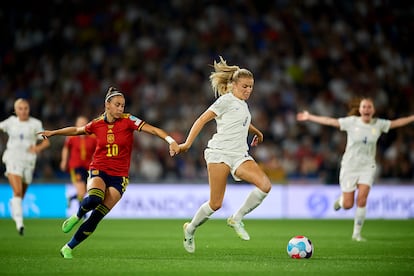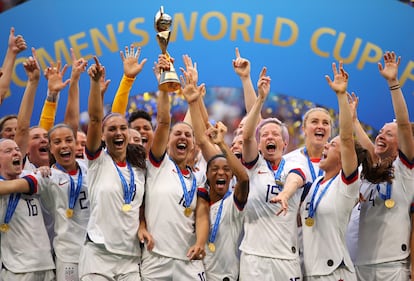Women’s World Cup still without a TV broadcaster in Europe’s ‘big five’ soccer nations
FIFA has rejected reduced bids from the public broadcasters of Spain, Germany, the United Kingdom, France and Italy, which are now pursuing a deal through the European Broadcasting Union

A month and a half before the kick-off of the Women’s World Cup in Australia and New Zealand, fans in Europe’s ‘big five’ soccer nations still have no idea whether they will be able to watch the tournament on television. FIFA has rejected reduced offers from the public broadcasters in Germany, the United Kingdom, France, Italy and Spain. World soccer’s governing body has refused to sell the rights to the competition that acts as a major showcase for the women’s game. Their last hope lies in the joint negotiations that the aforementioned five countries, all of which have qualified for the tournament, have conducted in recent days through the European Broadcasting Union (EBU). If an agreement cannot be reached, FIFA will endeavor to remedy the situation by implementing an application that will allow these countries to follow the tournament by means of live streaming broadcasts, which are less accessible and of poorer quality than the conventional channels.
”This is a slap in the face of all the great players in the World Cup and, effectively, all women worldwide. To be very clear, it is our moral and legal obligation not to undersell the World Cup. Should the offers continue not to be fair, we will be forced not to broadcast the Fifa Women’s World Cup into the ‘big five’ European countries,” warned Italian-Swiss FIFA President Gianni Infantino on May 2. The failure to sell the broadcasting rights to the major women’s football competition for a price that would at least meet FIFA’s expectations prompted its president to deliver this aggressive speech. Days later, bidding increased to €4 million by the BBC and Germany’s RTL, but also failed to meet FIFA’s expectations. According to industry sources, Spain’s public broadcaster Televisión Española (TVE) did not even make a formal offer. When consulted by this newspaper, TVE declined to comment on the matter, but it confirmed that a formal bid had not been made: “Our commitment to the promotion of women’s football is undeniable. And we continue to sustain this commitment to the promotion of women’s sports.” The same industry sources claim that a private Spanish operator has offered just under €1 million for the rights.
”The reality is that many people talk about equality, but when the time comes to put the money on the table, there isn’t a lot there,” Fatma Samoura of Senegal, FIFA’s secretary general, said in a conversation with EL PAÍS on May 11 following the presentation of the World Cup trophy. “Since Gianni Infantino has been president, we have invested $1 billion in the development of women’s football and we have run a lot of programs to improve the level both on and off the pitch. We want one simple thing, for the efforts that FIFA is making to balance women’s football with men’s football, to also be made by our partners. Women’s football cannot only be developed with FIFA, in order to play we need to enhance the value of it,” said Samoura.

This is the first time FIFA has auctioned the Women’s World Cup on an individual basis. In the past, the broadcasting rights were included in the sales package for the men’s World Cup. The strategy of unbundling the marketing of the broadcasting rights has also been extended to the sponsorship program. In this context, FIFA has encountered little difficulty in finding advertisers to meet its financial demands. This is a far cry from the negotiations with the public broadcasters of the five countries in question. The frustrated attempts to reach an agreement last week prompted their respective sports ministers to sign a joint letter amid mounting criticism, especially in Germany and the United Kingdom. “We have been concerned to learn that, so far, television rights have not been awarded for matches to be televised in our respective countries. We understand that there are legitimate interests and budgetary constraints that put pressure on both rights holders and independent broadcasters, who require a viable financial model. Due to the enormous potential of the Women’s World Cup and the sporting and social issues involved, we believe it is our responsibility to fully mobilize all stakeholders to come to an agreement quickly,” read the letter signed by the five ministers.
Morning programming and the difficulty in obtaining a satisfactory financial return were the main points raised by the five public broadcasters. TVE paid €32 million for the audiovisual rights to broadcast the men’s World Cup in Qatar and, according to the corporation’s president, Elena Sánchez, it only earned €1,102,500 due to restrictions established by the National Commission for Markets and Competition, which prevented the sale of advertising from companies other than FIFA’s sponsors. Regarding the Tokyo Games, with a similar scheduling to that of New Zealand and Australia, TVE paid €57 million.
”France’s matches will be played at midday and Spain’s at 9:30 a.m.. This is not early, it will be played during the summer, when almost everyone is on vacation. In my opinion, the schedules are not a fair excuse,” says Samoura. “Spain is a major player in women’s football and more than 1 billion people will be following the World Cup. It is time to do more. It is not conceivable that one of the countries among the favorites will not be broadcasting the matches,” concludes the FIFA secretary general.
Sign up for our weekly newsletter to get more English-language news coverage from EL PAÍS USA Edition
Tu suscripción se está usando en otro dispositivo
¿Quieres añadir otro usuario a tu suscripción?
Si continúas leyendo en este dispositivo, no se podrá leer en el otro.
FlechaTu suscripción se está usando en otro dispositivo y solo puedes acceder a EL PAÍS desde un dispositivo a la vez.
Si quieres compartir tu cuenta, cambia tu suscripción a la modalidad Premium, así podrás añadir otro usuario. Cada uno accederá con su propia cuenta de email, lo que os permitirá personalizar vuestra experiencia en EL PAÍS.
¿Tienes una suscripción de empresa? Accede aquí para contratar más cuentas.
En el caso de no saber quién está usando tu cuenta, te recomendamos cambiar tu contraseña aquí.
Si decides continuar compartiendo tu cuenta, este mensaje se mostrará en tu dispositivo y en el de la otra persona que está usando tu cuenta de forma indefinida, afectando a tu experiencia de lectura. Puedes consultar aquí los términos y condiciones de la suscripción digital.









































